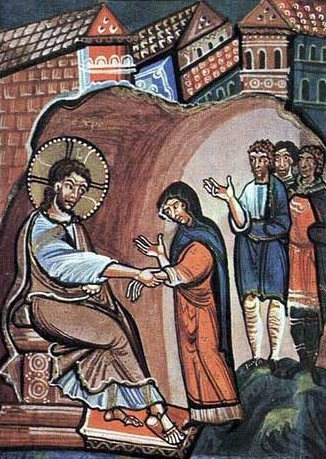Christian Art | Jesus Heals The Withered Hand
Mark 2: 23 – 3: 6 – 9th Sunday Year B (King James Audio Bible KJV, Spoken Word)
23 And it came to pass, that he went through the corn fields on the sabbath day; and his disciples began, as they went, to pluck the ears of corn.
24 And the Pharisees said unto him, Behold, why do they on the sabbath day that which is not lawful?
25 And he said unto them, Have ye never read what David did, when he had need, and was an hungred, he, and they that were with him?
26 How he went into the house of God in the days of Abiathar the high priest, and did eat the shewbread, which is not lawful to eat but for the priests, and gave also to them which were with him?
27 And he said unto them, The sabbath was made for man, and not man for the sabbath:
28 Therefore the Son of man is Lord also of the sabbath.
1 AND he entered again into the synagogue; and there was a man there which had a withered hand.
2 And they watched him, whether he would heal him on the sabbath day; that they might accuse him.
3 And he saith unto the man which had the withered hand, Stand forth.
4 And he saith unto them, Is it lawful to do good on the sabbath days, or to do evil? to save life, or to kill? But they held their peace.
5 And when he had looked round about on them with anger, being grieved for the hardness of their hearts, he saith unto the man, Stretch forth thine hand. And he stretched it out: and his hand was restored whole as the other.
6 And the Pharisees went forth, and straightway took counsel with the Herodians against him, how they might destroy him.
In these Bible verses, Jesus teaches that the Pharisees have got it all wrong in relation to the Sabbath. While God gave the Sabbath to man as an opportunity to rest and to devote himself to divine worship, the Pharisees have choked the meaning of the Sabbath in a mass of legalese, turning it from being a time of joy into a time of anxiety and empty observance.
Jesus plucks the ears of corn because he and his disciples are hungry. It is good for Jesus to feed himself and his disciples, and so also to demonstrate that it is good for us to satisfy our basic, natural needs. By doing so, Jesus demonstrates his authority in interpreting the law, and in correcting the errors of the Pharisees.
Jesus recalls the actions of the great King David, reminding the Pharisees how he took the bread of the Presence, the twelve loafs placed each morning on the table in the sanctuary, to feed himself and his companions. The connection is made between the great historical king and the new and eternal king, Jesus. The Pharisees are asked to look again at the rules they have inherited, and which they seek to enforce. They are confronted with an overturning of their claim to authority. The Sabbath was made for man, and therefore Christ is Lord also of the Sabbath.
These meanings are emphasized as Christ heals on the Sabbath. How, we may ask, could this possibly be wrong? We all ask to be healed on the Sabbath, or now the Lord’s day. Christ now looks at the Pharisees with anger. Their abuse of their religious authority is evil. As if further to prove this, the Pharisees and the Herodians, who were themselves enemies, now conspire together to try to destroy the one who is wholly good.
‘BLESSED is the man that walketh not in the counsel of the ungodly, nor standeth in the way of sinners, nor sitteth in the seat of the scornful.
2 But his delight is in the law of the Lord; and in his law doth he meditate day and night.
3 And he shall be like a tree planted by the rivers of water, that bringeth forth his fruit in his season; his leaf also shall not wither; and whatsoever he doeth shall prosper.
4 The ungodly are not so: but are like the chaff which the wind driveth away.
5 Therefore the ungodly shall not stand in the judgment, nor sinners in the congregation of the righteous.
6 For the Lord knoweth the way of the righteous: but the way of the ungodly shall perish.’ (Psalm 1)
Miracle | Prayer | Healing

![]()
King James Audio Bible | Endnotes
Why Do People Reject Jesus?
The rejection of Jesus is complex. Here, we see two instances where Jesus confronts the religious authorities of his day.
The first incident involves Jesus’ disciples plucking ears of corn on the Sabbath, which the Pharisees considered to be a violation of the Sabbath law. The second incident involves Jesus healing a man with a withered hand on the Sabbath, which again drew the ire of the Pharisees.
The reason why the Pharisees rejected Jesus is twofold. First, they were deeply committed to the Law and tradition. The Pharisees saw themselves as the guardians of the Law, and believed that the Law was essential to maintaining the identity and purity of the Jewish people. For the Pharisees, any deviation from the Law was a threat to the very foundations of Judaism.
Second, the Pharisees were threatened by Jesus’ message and authority. Jesus was challenging the religious status quo, and his message of love, compassion, and forgiveness was a direct challenge to the legalistic and rigid interpretation of the Law that the Pharisees upheld. Jesus was also performing miracles and claiming to be the Son of God, which was seen as blasphemous by the Pharisees.
Many have been threatened by the message of Jesus.
One example of this is the Enlightenment period, where many intellectuals rejected Christianity as irrational and superstitious. They saw Christianity as a relic of a bygone era, and believed that reason and science were the only reliable guides to truth.
In the modern era, some people reject Christianity because they see it as incompatible with modern values such as tolerance, diversity and individualism – all of which Christianity celebrates.
Heresy
Through history of Christianity, there have been debates about the nature of Jesus.
The Arian heresy was of the fourth century.
Arius, a priest from Alexandria, taught that Jesus was not co-eternal with the Father, but was a created being.
The Arian heresy was resolved at the Council of Nicaea in 325 AD, where the orthodox view of the Trinity was affirmed. However, the controversy continued to simmer for many years, and there were still many who rejected the orthodox view of Jesus.
In the modern era, there have been those who have questioned the historicity of Jesus and the reliability of the Biblical accounts. Some have argued that Jesus was a mythological figure, while others have argued that the stories about Jesus were embellished and distorted over time.
In the Catholic Church, the rejection of Jesus is seen as a grave sin, as it separates the individual from the grace and mercy of God. The Catechism Of The Catholic Church teaches that ‘there is no offense, however serious, that the Church cannot forgive’ (CCC 982), and that the sacrament of reconciliation is available to all who repent and turn to God.
In the Protestant tradition, the rejection of Jesus is seen as a rejection of the gospel message, which offers salvation to all who believe. Martin Luther, founder of the Protestant Reformation, wrote that ‘the gospel is a treasure that can never be exhausted, and that we should never stop proclaiming it to all people, even to those who reject it’ (The Smalcald Articles).
Why Do People Reject Jesus?
One reason people reject Jesus is due to a lack of understanding. As Jesus said in John 3:19-20: ‘And this is the condemnation, that light is come into the world, and men loved darkness rather than light, because their deeds were evil. For every one that doeth evil hateth the light, neither cometh to the light, lest his deeds should be reproved.’ Many people are content to live in darkness and ignorance, unwilling to confront the truth about themselves and the world around them.
Another reason people reject Jesus is due to a lack of faith. As the author of Hebrews wrote in Hebrews 11:6: ‘But without faith it is impossible to please him: for he that cometh to God must believe that he is, and that he is a rewarder of them that diligently seek him.’ Faith is the cornerstone of Christian belief, and without it, it is impossible to fully understand and accept the truth of the gospel message.
Fear can also play a significant role in the rejection of Jesus. As Jesus said in Matthew 10:28: ‘And fear not them which kill the body, but are not able to kill the soul: but rather fear him which is able to destroy both soul and body in hell.’ Many people are afraid to confront the reality of their own sinfulness and the consequences of rejecting Jesus, and so they turn away from him rather than face their fears.
Pride is another obstacle to accepting Jesus. As the apostle Paul wrote in Romans 1:21-22: ‘Because that, when they knew God, they glorified him not as God, neither were thankful; but became vain in their imaginations, and their foolish heart was darkened. Professing themselves to be wise, they became fools.’ Many people are convinced of their own knowledge and understanding, and refuse to accept the truth of the gospel message because it contradicts their preconceived ideas and beliefs.
As the apostle Saint John wrote in John 1:12: ‘But as many as received him, to them gave he power to become the sons of God, even to them that believe on his name.’ May we all have the faith and courage to accept the truth of Jesus and to live according to his teachings, finding the hope and salvation that can only come from him.






